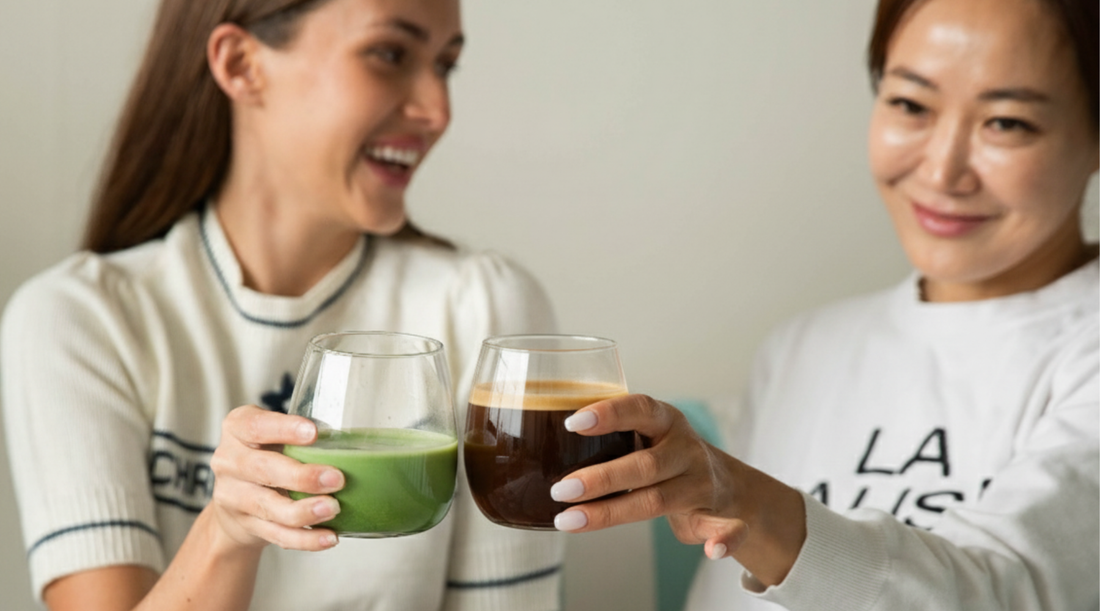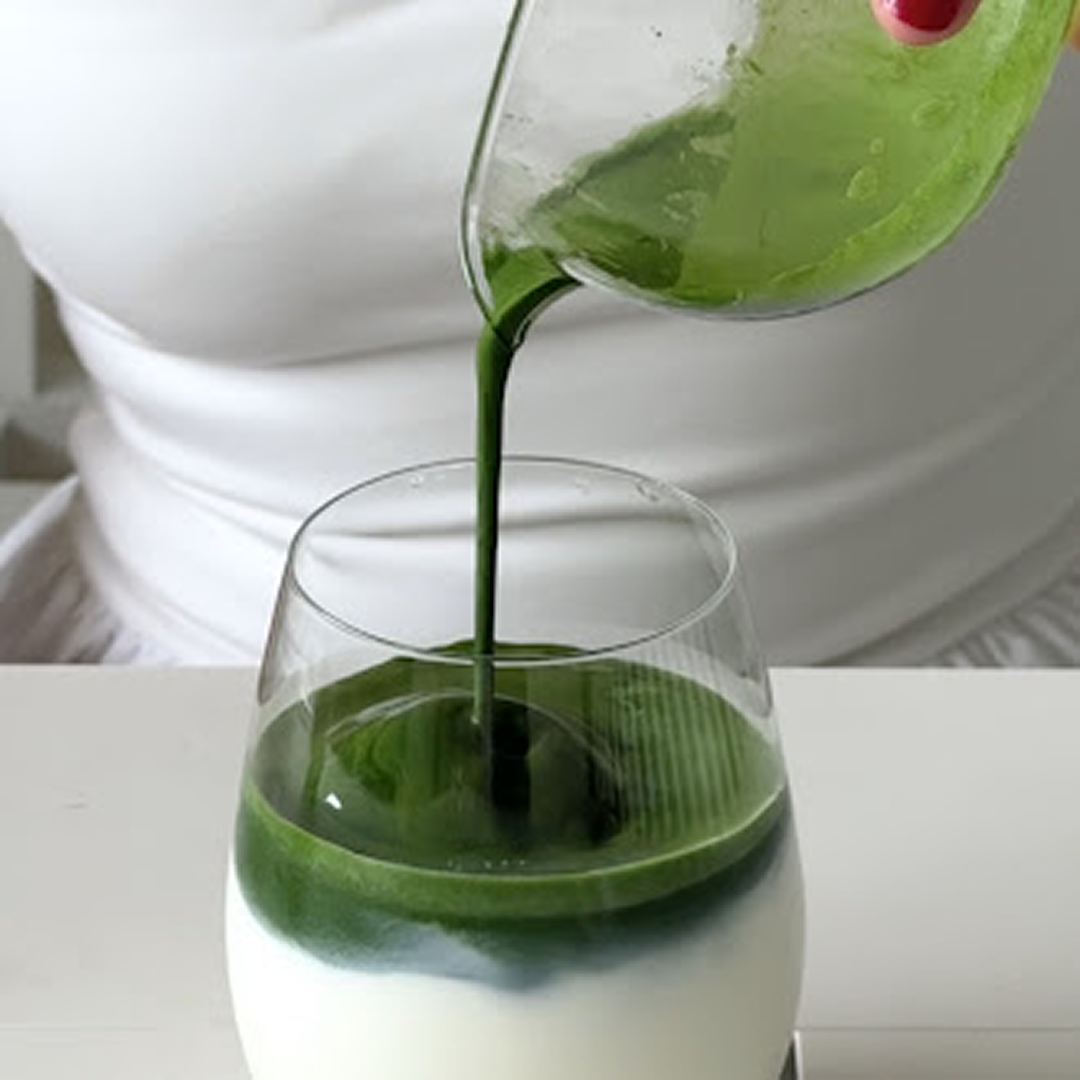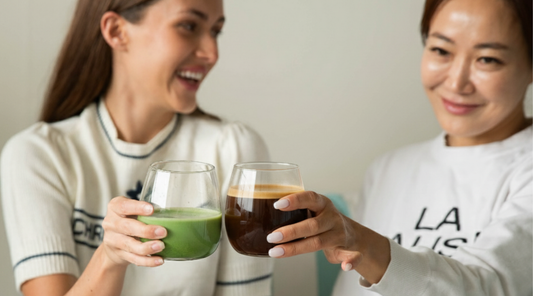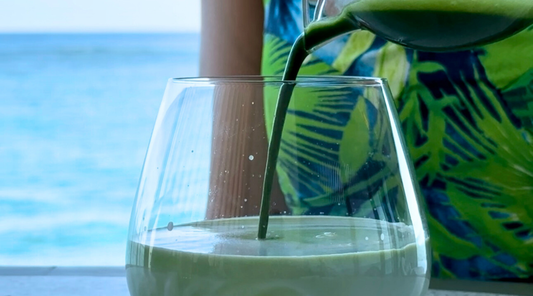
Matcha: Is It Healthier Than Coffee?
Share
In an age where mornings often start with a cup of caffeine, coffee has long been the world’s daily ritual. Yet, a vibrant green challenger has quietly stepped into the spotlight: matcha. Unlike coffee, which is brewed from roasted beans, matcha is made from finely ground whole green tea leaves, meaning you consume the entire leaf and all its nutrients.
But does that make it healthier? Below, we’ll explore matcha versus coffee through the lens of nutrition, energy, stress, and focus, guiding both beginners and tea enthusiasts toward a more mindful cup.
Ready to make the switch? Discover our range of premium Japanese matcha from smooth everyday blends to rare cultivars like Saemidori and Okumidori.
Does Matcha Have More Caffeine Than Coffee?
Coffee delivers an instant caffeine surge, about 90–120 mg per cup, depending on roast and brew method. Matcha, by contrast, provides a gentler lift with 60–70 mg per serving, moderated by L-theanine, an amino acid that slows caffeine absorption and smooths its effects.
Instead of a sharp spike and crash, matcha produces steady energy and calm focus for several hours. Studies highlight this caffeine-L-theanine balance as the reason matcha supports alertness without overstimulation, what many call clean energy.
According to Healthline’s matcha analysis, this unique combination allows matcha drinkers to feel alert yet centred for several hours. For experts, this synergy between caffeine and L-theanine supports what neuroscientists call “alpha brain waves,” often linked to concentration and creative flow.
For an in-depth guide, check out our article "How Much Caffeine Is in Matcha Compared to Coffee?"
Which Has More Antioxidants: Matcha or Coffee?
Both beverages are rich in antioxidants, but matcha stands apart because you consume the whole leaf, not just an infusion. This gives matcha up to three times the antioxidant capacity of coffee and as much as 137× more EGCG (epigallocatechin gallate) than regular green tea.
According to research published in Foods (Jakubczyk et al., 2020), matcha’s catechins, especially EGCG, help reduce oxidative stress and may support heart health and metabolism.
Coffee’s chlorogenic acids have their own anti-inflammatory benefits, yet matcha’s catechins, chlorophyll, and vitamins A, C, and K provide a broader nutrient profile, supporting heart health, skin, and metabolism.
If you like, I can also dig up a study directly comparing antioxidant activity in matcha vs. coffee and give you numbers.
Which Is Better for Focus and Mental Clarity?
Both matcha and coffee enhance mental performance, but they do so differently. Coffee’s sharp caffeine surge stimulates alertness but may also overstimulate the nervous system, leading to anxiety or restlessness in sensitive individuals.
Matcha, however, offers a more balanced neurochemical effect. Its caffeine works in harmony with L-theanine to enhance dopamine and serotonin levels, improving attention span, focus, and memory without overstimulation. Clinical research published in the Journal of Functional Foods found that this pairing supports sustained cognitive performance ideal for those who need clear, steady concentration throughout the day.
For experts: this is a classic example of nootropic synergy. Caffeine acts as the stimulant, while L-theanine serves as the modulator.

Is Matcha Easier on the Stomach Than Coffee?
Coffee’s acidity and stimulation of gastric acid can cause discomfort or reflux. Matcha is lower in acidity and alkalising, making it gentler on digestion. Chlorophyll and catechins further help soothe and balance the stomach environment, making matcha a better option for sensitive drinkers.
Does Matcha Help Reduce Stress Compared to Coffee?
Coffee can trigger cortisol spikes, your body’s stress hormone, which may raise heart rate and tension. Matcha’s L-theanine counters this by promoting relaxation and reducing stress markers. Research shows this duo of caffeine + L-theanine enhances attention while keeping the body calm. This is matcha’s reputation for “relaxed alertness.”
For experts: regular matcha drinkers often report stable blood sugar and smoother adrenal function, largely due to its amino acid profile and lower glycaemic impact, compared to coffee-based drinks loaded with milk or syrups.
Practical Comparison: Coffee vs Matcha at a Glance
| Feature |
Matcha |
Coffee |
| Caffeine (per cup) | ~60–70 mg | ~90–120 mg |
| Antioxidants | High (EGCG, catechins) | Moderate (chlorogenic acids) |
| Energy Curve | Slow, sustained | Sharp spike and crash |
| Acidity | Low | High |
| Stress Response | Calming (L-theanine) | Stimulating (cortisol spike) |
| Consumption | Whole leaf (powdered) | Brewed liquid |
| Taste Profile | Umami, vegetal, smooth | Bitter, roasted, aromatic |
Expert Insights: How to Maximise Matcha’s Health Benefits
- Choose ceremonial-grade matcha for daily consumption. Lower culinary grades may lack the full nutrient profile and flavour balance.
- Avoid boiling water. Keep it around 70–80°C to preserve L-theanine and prevent bitterness.
- Whisk, don’t stir. Whisking aerates the tea, enhancing both mouthfeel and nutrient absorption.
- Pair with protein-rich snacks to maintain steady energy levels throughout the day.
For guidance on proper brewing, see Maison Koko’s Matcha to Water Ratio Guide.
Potential Downsides: Not All Matcha Is Equal
Just as not all coffee is specialty-grade, not all matcha is pure. Lower-quality matcha can be oxidised, dull, or cut with fillers. Look for:
- Origin transparency (regions like Uji, Yame, or Nishio in Japan).
- Shade-grown on the label.
- Bright green colour (a sign of freshness and chlorophyll content).
FAQs
Is matcha healthier than coffee?
It depends on your needs. For antioxidants, sustained energy, and gut balance, matcha wins. For higher caffeine and stronger stimulation, coffee does.
Can I replace coffee with matcha entirely?
Yes, though some enjoy alternating between them. Start with one serving of matcha daily and notice how your focus and mood respond.
Can I drink both?
Absolutely. Many wellness enthusiasts enjoy coffee in the morning and matcha in the afternoon for steady energy and reduced stress.
Does matcha detoxify the body?
While “detox” is an overused term, matcha’s chlorophyll supports the liver and may help the body process toxins more efficiently.
How do I know if my matcha is authentic?
Look for Japanese origin, vivid green colour, and a naturally sweet, umami-rich aroma, not bitterness.
Final Thoughts
So, is matcha healthier than coffee? For most, yes, but not because it replaces coffee. Matcha provides a calmer, more sustainable energy, a deeper nutritional profile, and a sensory ritual rooted in centuries of Japanese tradition.
Coffee has its charm and its science-backed benefits too, but for those seeking a balanced daily pick-me-up that supports focus, calm, and wellbeing, matcha is the smarter cup.
Want to experience matcha the way it’s meant to be, smooth, vibrant, and authentically Japanese? Explore our diverse matcha collection to find one that matches your taste and lifestyle.




